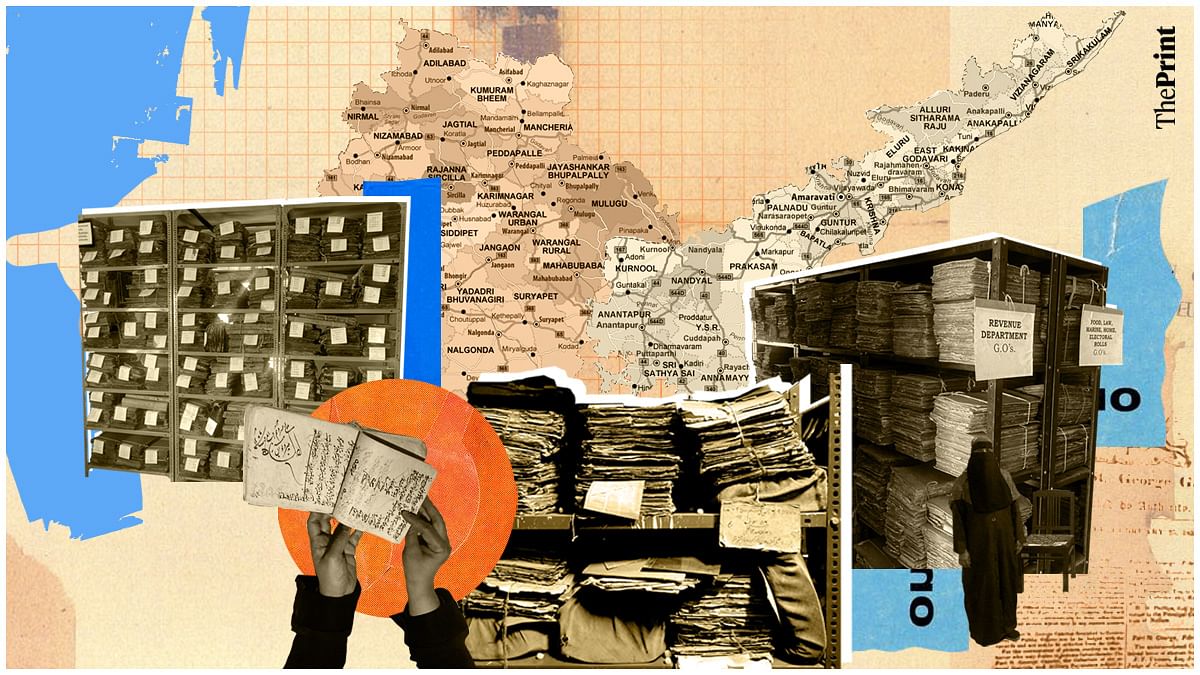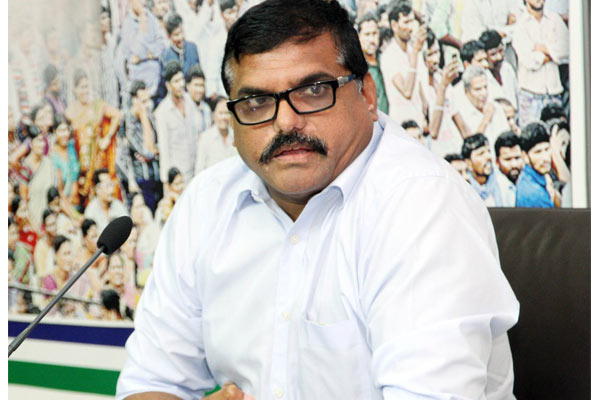In Telangana and Andhra Pradesh, the archives are preventing

In Hyderabad, the archives are preventing.
History has two claimants – the Telangana State Archives and the Andhra Pradesh State Archives. The state of Andhra Pradesh was break up into two a decade in the past. But it surely’s been more durable to carve up the area’s historical past into two uncontestable halves.
It’s a tug-of-war, and every state is pulling on the brittle papers of the previous. “Whose historical past?” is on the coronary heart of this battle.
The partitions of the Telangana State Archives, just like the paperwork they home, are crumbling. A leaky pipe drips water right into a bucket exterior the director’s workplace. Centuries-old fraying data in Persian and Urdu lie uncovered in dusty, darkish, cramped rooms. And 300 kilometres away, throughout state borders, the director of the Andhra Pradesh State Archives sits in a largely empty however shiny new constructing. His spanking new workplace is surrounded by rooms he has but to fill. He’s ready for the archival papers to reach from Telangana, which refuses to half with them.
And what’s at stake is the historical past of recent Hyderabad.
They’re at loggerheads over land data and authorities orders from the Nizam’s authorities between 1948 and 1956 — paperwork that kind the inspiration of the erstwhile metropolis that was as soon as Andhra Pradesh’s capital. The bone of competition is the transient overlap between when the state of Hyderabad acceded to India and when the state of Andhra Pradesh was created. And each Andhra Pradesh and Telangana have staked their declares on these data.
But it surely’s not nearly historical past. It’s about language, faith, and the cultural id of two fiercely proud traditions — embodied by the administrators on the helm of each archives, V. Ranga Raj and Zareena Parveen. The 2 used to work as shut colleagues in an unbifurcated Andhra Pradesh, however the break up between the states in 2014 has pressured them into separate corners, preventing over the stays of the day competing claims.
“We had a cordial and proper bifurcation, we did,” says Zareena Parveen, director of the Telangana State Archives. “However how can I break up the archives in half? It’s not their historical past. It’s our historical past. It’s the historical past of Hyderabad and the Deccan.”
Skilled committees had been arrange, the data have been categorised, the switch checklist has been ready, and contracts have been signed. A memorandum of understanding, endorsed by the 2 administrators in 2018, guarantees “mutual cooperation.” Seven out of the 12 agreed-upon classes of data have even travelled in vehicles from Hyderabad, Telangana, to their new repository in Mangalagiri, Andhra Pradesh.
And but, practically a decade later, the 2 states haven’t but managed to totally separate their histories. And never even determine what belongs to who.
Additionally learn: Vidita Vaidya, the neuroscientist serving to us perceive how mind capabilities below stress
What the archives are preventing over
The interval between 1948 and 1956 — when the final Nizam of Hyderabad, Mir Osman Ali Khan, dominated — is what’s contested.
Authorities orders and land data from this era got here with a number of copies, as was customary for farmans (an order or command) from the Nizam’s authorities. Telangana maintains the best to carry on to those originals, and Andhra Pradesh can have their digitised model. Andhra Pradesh says they need to have them too — if not, no less than the primary copies of the originals.
The Telangana archives comprise essential paperwork from eras comparable to the Mughal interval and the Nizam’s governments. Examples embrace paperwork of a Muslim freedom fighter lifeless set in opposition to the Partition of India, or farmans just like the Nizam sanctioning Rs 1 lakh to Banaras Hindu College in 1939, or an 1876 order banning sati observe in Hyderabad state.
“All these paperwork are in Urdu or Persian anyway,” stated Parveen, an achieved and famend scholar of each who has additionally written extensively on the archives’ Urdu and Persian data. “We have now language specialists right here. They gained’t be of a lot use over there in Andhra,” she stated, referring to the predominance of Telugu and the Telugu script in Andhra.
Of the 43 million paperwork on the Telangana State Archives, 85 per cent of the data are in Urdu and Persian — the oldest being a Bahmani period land grant from 1406. There are additionally Mughal-era paperwork from the reigns of Shah Jahan and Aurangzeb.
“Our archive is a gold mine. Folks do not know what khazana (treasure) is right here,” stated Parveen, elevating her eyebrows suggestively. Her counterpart in Andhra Pradesh is actually conscious of this, having labored on the identical archive along with her for many years.
The jewel within the Andhra Pradesh State Archives’ crown is the private letters of a person whose storyline was nominated for a Golden Globe. The diaries and letters of revolutionary Alluri Sitarama Raju, on whom the historic movie RRR was based mostly, squarely belong with the Andhra Pradesh State Archives. Telangana just isn’t preventing to maintain them. It is because they’re in Telugu and largely confined to one in all Andhra Pradesh’s 13 districts and do not intersect with one in all Telangana’s 10 districts.
“It’s public property,” says V. Ranga Raj, spreading his palms leaning again into his leather-based chair. “Earlier we had been working collectively, now there are quarrels. So it was tough when bifurcation occurred. We turned depending on them — as a result of our data are there!”
Additionally learn: ‘Mathura isn’t Kashi’: BJP plan to develop Bankey Bihari temple space has riled up Hindus
There’s no template
However Andhra Pradesh getting its personal archive is an anomaly.
The state archives of different reorganised states, like Bihar, Jharkhand, Madhya Pradesh, and Chhattisgarh, haven’t fought this battle.
“Being the mother or father state of Bihar and Jharkhand, Bihar retains all of the data,” stated Suman Kumar, the director-in-charge of the Bihar State Archives.
Bihar is among the few Indian states with a Public Data Act, launched in 2014, and it states that no public data are to be transferred from their repository. Kumar pointed to the difficulties of transporting fragile paperwork and stated that if students or the Jharkhand authorities require paperwork, they will journey to Patna to entry them. Plus, earlier than the state was bifurcated, Ranchi had a regional report workplace. This workplace has retained its data and is now Jharkhand’s official archive.
The case is comparable in Madhya Pradesh and Chhattisgarh. There have been copies carried to Raipur, however all of the originals have remained in Bhopal, in keeping with Kadam Singh Mena, a workers member on the Madhya Pradesh State Archives. Based on a latest information report, the Madhya Pradesh State Info Commissioner Rahul Singh referred to as for state laws to be launched to guard public data, reportedly after frequent complaints of lacking paperwork.
A part of the difficulty, in keeping with archivists, is that the newer states, carved out of their mother or father state, aren’t requesting data for their very own archive.
The way in which that Andhra Pradesh and Telangana select to proceed would possibly simply be the blueprint for additional regional conflicts over historical past.
Additionally learn: YouTube new playground for Indian cricket followers. Right here Kohli can rating 100 in opposition to Pakistan
The cultural break up
An awesome feeling of resentment was one of many driving components behind Andhra Pradesh’s break up in 2014. These from Telangana felt that individuals from Andhra Pradesh loved supremacy within the state and had been utilizing the state’s sources to line their very own coffers.
Parveen and Ranga Raj at the moment are the joint record-keepers of the area’s historical past. However the protracted calls for of the state break up are enjoying into who will get which historical past and whose historical past is a precedence to them. One sees it because the historical past of the Deccan; the opposite sees it because the historical past of the Telugus.
So when it got here to the query of who would succeed Parveen as director of the Telangana State Archives in 2015, the burning backdrop of bifurcation dictated the choice. Subsequent in line was her deputy director, Ranga Raj — a person from Andhra Pradesh.
He by no means obtained the promotion. Parveen stayed within the publish. And the choice created a fissure that also hasn’t healed. The one that used to report back to her and even referred to as her ‘Akka’ (elder sister) is now making his personal calls for.
Ranga Raj obtained his due when the archives had been formally break up in 2018. He moved to Mangalagiri and took cost of the five-storey constructing that now homes 4 different Andhra Pradesh authorities workplaces. The archives moved into the constructing first and have two complete flooring to themselves. The constructing is surrounded by sprawling fields in a city that doesn’t seem to be it headquarters essential state workplaces.
It’s a far cry from the dilapidated Telangana archive constructing in Tarnaka in Hyderabad, on a 99-year lease from Osmania College.
Ranga Raj visits his previous office often — he estimates as soon as each three months. He final visited in early December 2022. He travels to supervise the switch strategy of the remaining data and meet up with his previous colleagues and pals. He has to keep up a superb relationship with them, he stated, in order that the switch course of goes easily. He’ll catalogue every little thing as soon as the switch is full and take inventory of the situation of the data.
“Andhra-Telangana emotions had been there, but it surely gained’t cease the work from occurring,” stated Mohd. Abdul Raqeeb, assistant director of the Telangana State Archives. He’s on glorious phrases with Ranga Raj, and the 2 keep in frequent contact. Raqeeb is extra closely concerned within the day-to-day features of the switch and retains tabs on its progress. All paperwork after 1956 — formally frequent property between the 2 states — have to be copied and despatched to Andhra. The method hasn’t begun but as a result of neither state has the finances for it.
Andhra Pradesh and Telangana determined to separate all their belongings in a 52:48 ratio. However the administrators are struggling to use this to the areas’ intangible historical past. And what’s extra is that they really feel that is nonetheless inequitable. Ranga Raj feels entitled to extra data, however the brand new state of Andhra Pradesh is house to 5 regional workplaces – in Tirupati, Anantapur, Vijayawada, Rajahmundry, and Visakhapatnam – whereas Telangana was allotted just one. It’s one of many the reason why Parveen is preventing so exhausting to maintain what’s in Hyderabad.
The workers of the archives, like each different state asset, had been additionally break up in a 58:42 ratio.
The entire posts the archives had been authorised to have was 180, of which 104 went to Andhra Pradesh and 76 had been retained by Telangana. The Andhra Pradesh Archives at the moment has solely 11 everlasting workers, of which solely 4 are in Mangalagiri, and the remaining seven are posted throughout totally different regional centres. The Telangana Archives at the moment has 36 everlasting members of workers.
Funding can also be a problem. In February 2022, the Telangana authorities sanctioned Rs 1 crore for the digitisation of data. The Archives additionally lately signed an MoU with the Authorities of Iran to bind and protect older paperwork and to digitise microfilm.
“Telangana is our state, we will’t betray it,” stated Parveen, who’s seen by her workers members as synonymous with the establishment she heads. “Andhra left this state. It has not left its historical past behind, why should it take ours?”
Additionally learn: Rose, sandalwood, petrichor—Gulabsingh Johrimal that captured Mughals with ‘Indian’ scents
Pretend information, forgeries, false claims
The contested paperwork are essential as a result of they element the formation of recent Hyderabad and, on the very least, are crucial to keep up an correct report of land possession.
The archives have a meandering historical past. They’re a mishmash of a number of totally different archives, which is why they’re tough to separate immediately. The Mughals, who administered the Deccan from Aurangabad, arrange their very own archives within the area, which got here to be often known as the Daftar-i-Diwani. Then, all Telugu language data had been transferred from the colonial archive of the Madras Presidency to Kurnool in an try to separate them on a linguistic foundation. These two archives had been introduced collectively because the Central Document Workplace in 1950, below the Nizam’s authorities in Hyderabad. It turned the Andhra Pradesh State Archives in 1956, after the formation of Andhra Pradesh. The data had been solely formally divided in 2018, 4 years after the bifurcation was finalised.
At play here’s a tinge of Telugu satisfaction historical past that’s colliding with Telangana historical past and Madras presidency historical past earlier than that. Disentangling one from the opposite is not only a bureaucratic train by two officers however one with heavy emotional funding for folks of each states.
“The paperwork that belong to Andhra area have been shifted right here (to Mangalagiri) — round 50-60 per cent is full,” stated Ranga Raj. Based on him, all of the paperwork transferred from the Madras Presidency, plus all of the data from 1956 to 2018, belong solely to Andhra Pradesh.
Parveen would disagree. The interval from 1956 to 2018, in keeping with her, must also be thought-about the historical past of Telangana, and the unique paperwork from 1948 to 1956 ought to keep inside Telangana as a result of these paperwork had been the property of the Hyderabad Central Data Workplace.
Land-related paperwork, which kind the majority of this contested property, aren’t solely of curiosity to students and teachers. They’re additionally sought out by activists or residents in search of to resolve disputes, examine histories of claims, or bolster their claims. Even state businesses just like the Waqf Board have an interest — they’re common guests to the archives, searching for paperwork that may have declared a sure parcel of land as waqf (endowment made to a charitable, instructional or spiritual trigger).
It’s particularly related in fashionable Hyderabad, a historic metropolis that’s been creating quick right into a technological and infrastructural hub in India. There have been fears concerning the bifurcation dulling Hyderabad’s shine. As an alternative, the previous decade has seen it turn into one in all India’s costliest residential markets, with international giants like IKEA and Lockheed Martin selecting the town as their base.
Additionally learn: What experiences on Indian ladies’s falling participation in labour drive don’t let you know
Points with infrastructure
Ranga Raj has that uncommon alternative most archivists dream of – constructing an archive from scratch in the best way he needs.
The Andhra Pradesh State Archives are able to fling open its doorways — to students and data alike.
It’s no shock that its director is attempting to invigorate the archives and set a brand new customary in stone. The data which have made their strategy to Mangalagiri are all neatly organised and stacked, with the extra delicate and brittle data preserved in anti-acid bins or between picket planks.
The repository’s rooms are divided by district and kind of report. Papers from the present Andhra Pradesh administration have already began arriving, dumped in a single massive room and sorted in actual time. There are not any studying rooms but, and students are but to reach on the new, distant location. Solely two overseas students have reached out to the archive since 2018 to investigate about data, whereas a couple of from close by universities have visited.
Ranga Raj even ready laws to protect public data, which he hopes might be launched within the Andhra Pradesh meeting in February 2023 by training minister Botsa Satyanarayana. He has not shared a duplicate of this regulation along with his counterparts in Telangana — it’s his exhausting work, in spite of everything.
He has contracted workers to return work with him. They’re all faculty graduates however not specifically educated in preserving data. Ranga Raj and the extra senior members of workers attempt to present them with coaching each three months. Throughout state borders, the workers in Telangana are languishing — lots of these left working there have been there for many years and have solely seen their office descend into increasingly more chaos.
“Due to the bifurcation, the workers has additionally gone,” stated B. Eswara Rao, affiliate professor at Hyderabad Central College who was utilizing the Telangana archive to entry public well being data. “And the folks working right here don’t learn about record-keeping. There are not any correct services to take a seat and skim additionally.”
The workers and students each agree that the archives aren’t a precedence for the state authorities — each in Andhra Pradesh and Telangana. It’s as a result of the archives are a service-oriented division that doesn’t generate income, in keeping with Ranga Raj. Employees are contracted at each archives and have been so for years. The measly three-member staff that appears after Persian data on the Telangana archives nonetheless doesn’t have everlasting jobs, regardless of being a part of a dwindling variety of specialists who can deal with such paperwork.
Students have seen this too. Indivar Jonnalagadda, PhD scholar on the College of Pennsylvania engaged on the intersecting politics of citizenship and property in Hyderabad, remembers a workers member telling him that “whereas the 2 states had been vying for objects within the collections and archives, neither state was taking possession of the establishment or the infrastructure. So bifurcation solely aggravated the state of affairs of the archives, which was one in all useful resource and workers shortage.” He added that it’s not clear to him what worth up to date governments give to archives. “From a proper to info and a scholarship perspective, I feel the best want of the archives is funding into infrastructure and workers and persevering with collections. I don’t suppose that’s on any authorities’s agenda,” Jonnalagadda stated.
There have additionally been allegations of bureaucrats and businessmen stealing papers to forge or use to their very own profit — the archives are rife with rumours.
Rajan Das, constructing superintendent of the Telangana State Archives, acknowledged these rumours, however stated that it’s not one thing they’ve the capability to handle proper now. “Mud is our greatest enemy!” he stated, staring wistfully out his giant window framed with peeling plaster and water-stained partitions. “It’s a tricky job. We don’t have the know-how or the educated workers to correctly keep our data. Within the meantime, we’ve got to ensure this constructing is up and working.”
He has two everlasting workers members who work with him. In mid-December final 12 months, a portion of the ceiling within the Persian report room fell down. The tables with open, uncovered data needed to be hurriedly rearranged, and the mud was neatly swept to the facet. The workers are used to creating do. In the course of the monsoons, rain floods the ground-floor rooms, and water seeps into the damp wells.
Additionally learn: Pedigree canines are India’s new therapists. ‘Hire-a-dog’ newest enterprise on the block
Curiosity and comparability
Each archives are understaffed and underfunded. Each are run by former pals dedicated to the aim of preservation.
And every little thing within the archives — from the data to the workers — is caught between them. “Andhra Pradesh and Telangana are like siblings. However typically working right here is like working between India and Pakistan,” jokes one workers member in Hyderabad.
Everybody in Hyderabad is within the new workplace run by their former deputy director. They’ve all heard how fancy and fashionable it’s, even whether it is in the course of nowhere. The envious questions they ask are much less about how the data are being organised and preserved and extra concerning the dimension of his workplace or the funding he’s obtained. One employee requested about how a lot hire the archives should pay for his or her two flooring.
However regardless of the curiosity, nobody from Hyderabad has truly gone to go to Mangalagiri. It’s solely a five-hour highway journey, however the two archives behave as if they’re separated by centuries.
Ranga Raj and the Andhra Pradesh State Archives have invited Parveen and the Telangana State Archive a number of instances to return and go to. However they’ve by no means visited. Her work, she says, is to carry the fort in Hyderabad.
(Edited by Tarannum Khan)




